Lemon Zest Vs. Lemon Juice: When And How To Use Each In Your Cooking
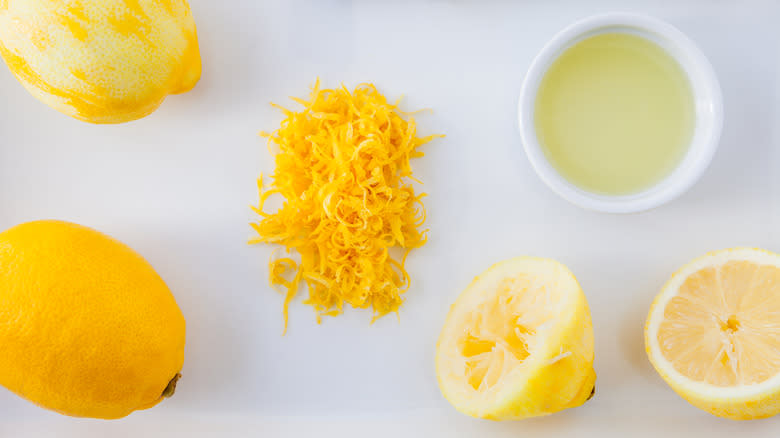
Lemon is one of those ingredients that seems to crop up in just about every recipe. Roasting a chicken? Squeeze some lemon on it. Making an apple pie? Ditto. Cocktails taste better with lemon. Salad tastes better with lemon. Even limes taste better with lemon if you look at the number of lemon-lime flavored products out there. You name it, lemon suits it. When following recipes that incorporate this miraculous citrus, however, you'll have noticed that some call for lemon juice while others call for lemon zest. Some recipes call for both. You might assume that the two are interchangeable –- they are both part of lemons, after all -- but there are several key differences that make them distinct from each other.
Lemon juice includes the liquid and sometimes the pulp that is produced when you squeeze a lemon. The zest is the outside layer of the fruit known as the flavedo. It is part of the peel but does not include the spongy white inner layer that has a bitter taste. Broadly speaking, both the juice and the zest provide a strong lemony flavor, but when you get into more detail, they have different functions.
Read more: 41 Must Try Hot Sandwich Recipes
Lemon Zest Is Full Of Essential Oil
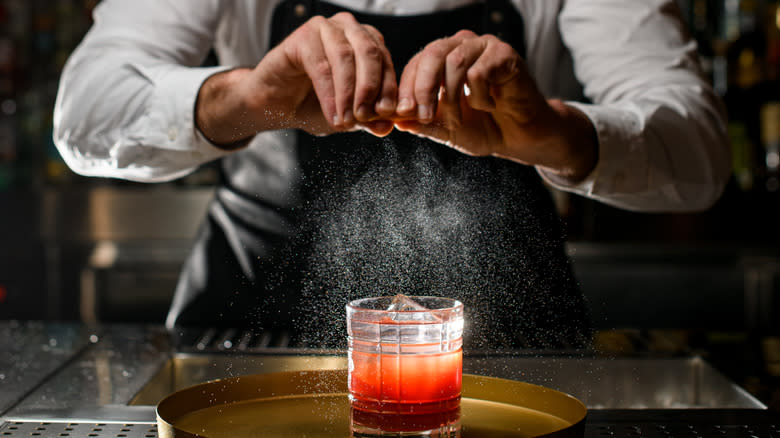
The mention of "essential oil" probably brings to mind expensive fragrance diffusers and aromatherapy, but in their original forms, these scented oils are found in a vast array of edible plants. Essential oils are naturally occurring compounds extracted from various parts of plants such as bark, leaves, peel, seeds, and flowers. They are not safe to ingest when they come from a bottle as they can be highly toxic. However, a twist of lemon peel yields a spritz of heady, fragrant oil that is safe to eat. One of its most common uses is in bartending. When making a drink with egg white, bartenders often add a twist of lemon peel to the surface of the drink to disguise the unappetizing scent of the egg white.
Aside from the culinary benefits of the oil found in the outermost layer of lemons, there are a host of health benefits. Essential oils have been shown to have antifungal and antimicrobial properties that can help in food preservation, while the bright, floral scent of lemon oil specifically may help ease nausea and soothe anxiety.
Lemon Juice Is More Acidic
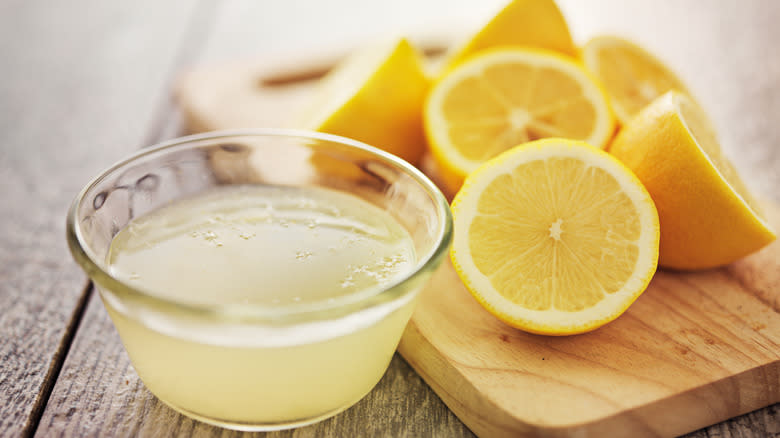
Fruits and vegetables vary greatly in their levels of acidity. On the far end of the spectrum, you get tangy, sour flavors; on the alkaline end of the spectrum, you get foods that taste bitter. If you've ever accidentally curdled milk by adding lemon to it, you'll know that lemon juice is extremely acidic. All citrus fruits have the tell-tale sour taste of acidity, but lemons are at the front of the pack. They are more acidic than limes, containing double the acidity of grapefruit juice and five times the acidity of orange juice.
Because of this, lemon juice, like vinegar, is often used purely for its acidic properties. In contrast, lemon zest is not particularly acidic. Even if you grated an entire lemon's worth of zest into water, it could not take the place of the acidity of lemon juice. If you need an acidic ingredient but do not have lemon juice on hand, lime juice is a better option than lemon zest.
Use Lemon Zest As A Garnish
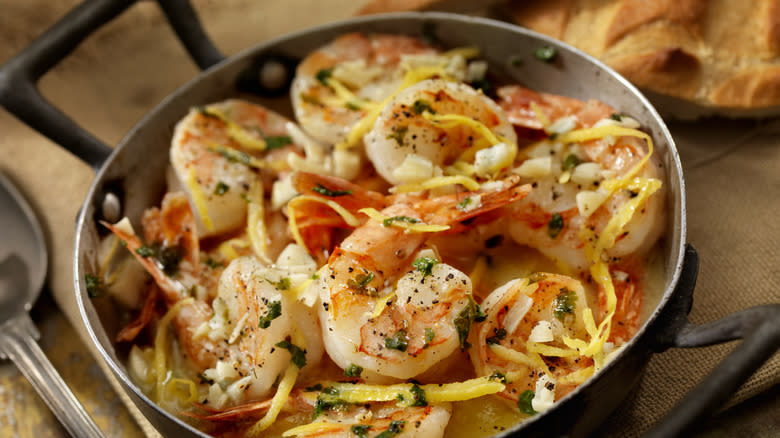
Lemon zest will never be the main character of a dish. Like lavender and rosewater, it can overpower an entire recipe even in small quantities and make a delicious balance of flavors taste like heavily scented soap. When used sparingly, however, it is so valuable that it may as well be made of gold. You can add it to cake batter and cookie dough, but you'll get the biggest bang for your buck by using it as a garnish. Not only does it lend a fresh zing of flavor, but it also adds a visual flourish, like fresh sage or a smattering of edible flowers.
As one of the most versatile ingredients at a cook's disposal, lemon zest can garnish just about anything. Some cocktails aren't complete without a twist of lemon zest on the rim of the champagne flute; certain creamy pasta recipes simply won't be as addictive without a layer of freshly grated zest. No matter what you're creating in your kitchen, a little lemon zest will go a long way to add flavor and a hint of sophistication to your food.
Use Lemon Juice To Tenderize And Denature Meat

Lemon juice is a game-changing ingredient in meat marinades. Because of its high acidity, it can break down surface proteins and leave you with succulent, tender pieces of meat that practically melt in your mouth. It is so acidic, in fact, that you need to time the marination carefully. Most recipes call for hours of marinating for the meat to absorb the flavors, but when lemon juice is involved, one hour is more than enough. Any longer and the citric acid will begin to break down the structure of the meat, making the surface mushy rather than tender.
The acid content is the reason why lemon juice (or lime juice) is used in ceviche. Beyond giving the dish a bright, tangy flavor, it makes the raw seafood safe to eat. Acid has such a low pH that it causes the proteins in the fish to change or "denature," preventing microbial growth and thereby reducing the risk of foodborne illness. The process mimics what happens during cooking but without the use of heat. Denaturing the fish with citric acid means that ceviche is not technically raw but tastes as though it is.
Use Lemon Zest For Color

Considering how much flavor lemons provide, they offer very little in the way of visual appeal. Lemon juice can transform a cake, but even if you put an entire cup of it into your recipe, you won't be able to see any traces. Contrast this with a handful of brightly colored berries or a scant teaspoon of matcha. To combat the near invisibility of lemon juice, reach for the zest.
When you add lemon zest to a dish, its yellow hue provides a striking contrast that hints at the citrus flavor lying within. A lemon drizzle cake looks like a run-of-the-mill vanilla cake until you sprinkle it with lemon zest, while a glass of frothy whipped lemonade could be mistaken for a plain milkshake without a lemon garnish.
The visual appeal of lemon zest should not be limited to lemon-flavored recipes. A pop of vibrant yellow stands out beautifully against the dark green leaves of a spinach salad and can add a hint of intrigue to the surface of a chocolate tart. Although zest does not provide the amount of yellow pigmentation associated with egg yolks or turmeric, it provides a floral, citrusy flavor that doesn't alter the texture of a dish or dominate its balance of flavors. Whether you're looking for a pop of color to signal the lemony taste of a dish or simply to provide aesthetic appeal, lemon zest should be your go-to ingredient.
Use Lemon Juice To Enhance Flavor

Most of us think of lemons as having a singular flavor that takes center stage in lemon bars and lemonade and lends a distinctive note to everything from salad dressings to sweet tarts. But as it turns out, this miraculous citrus fruit also has the power to alter the flavors of other ingredients. Like salt, lemon juice is a flavor enhancer, dialing up the taste of whatever food it's in. Think of it like a magnifying glass for your tastebuds. The flavors are already there, but add some lemon, and all of a sudden, they become vivid and focused.
The reason salt and lemon enhance flavor is that they both induce the production of saliva in your mouth. Saliva is a solvent that helps break down foods as you chew them and distribute them to your taste receptors. Because of this function, lemon juice indirectly maximizes the flavor of other ingredients, which is one of the reasons it crops up in so many recipes. Regardless of whether you're making a sweet or savory dish, lemon makes those flavors sing in a way that few other ingredients can. It does not even need to be detectable to make a difference. In foods like hummus and cheesecake, lemon juice might not register on your tongue, but it's working overtime to make the other flavors shine.
Use Lemon Zest To Infuse Alcohol

One of the best ways to capitalize on the taste of lemon zest is to add it to liquor. Infusing is the process of steeping ingredients such as herbs, spices, and zest in a liquid until the liquid takes on their flavors. Coffee and tea are types of infusions, but you don't have to use water. Infusing liquor will transform your homemade cocktails and turn you into an expert bartender with little effort.
Limoncello is perhaps the most common trade name for lemon-infused liquor. The Italian liquor is made by steeping lemon zest in ethanol or vodka (due to their neutral flavors) and adding simple syrup. You can easily make limoncello at home with three ingredients -- lemon zest, vodka, and sugar -- and your dinner parties will never be the same.
Infusing alcohol is simple, but there are several common mistakes to avoid. For example, using a high-quality base liquor is important if you want a tasty result, and you should avoid using spirits that have strong flavors such as whiskey and mezcal. Store the liquid in an airtight container in a cool, dry place. It will take several days to steep, but the time shouldn't be completely hands-off. Taste it every day to check its progress. If you leave it too long, it will become bitter. As soon as it's reached the desired taste, drain the liquid into a separate jar and discard the zest.
Use Lemon Juice To Upgrade Your Water
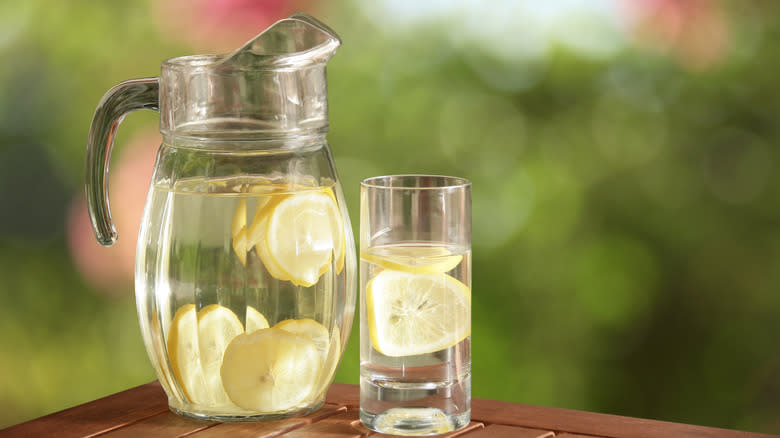
We all know that staying hydrated is important, and you probably know one or two people who carry around a bottle of water wherever they go. But remembering to drink throughout the day is harder than it sounds, and water just isn't that exciting. If you want to improve your hydration, adding lemon to your water is an easy and surprisingly effective hack. With just a single lemon, you can turn a liter of uninspiring liquid into a refreshing drink that you actually want to sip throughout the day.
Lemon water has more benefits than just tricking you into staying hydrated. The juice of one lemon provides 19 milligrams of vitamin C, which is 20% of your recommended daily intake. Vitamin C is a vital antioxidant that helps your body store iron, form blood vessels, muscle, and bones, and protect itself from environmental stresses. Getting 20% of your daily value through a delicious drink that takes almost no time to make seems like a no-brainer.
Lemon juice has also been shown to lower blood pressure and even reduce your risk of developing kidney stones. Considering it's much more enjoyable to drink than plain water, lemon water is a clear win-win. If you want to make it even more drinkable, though, you can always make your own lemonade. The sugar makes it less healthy than lemon water, but you'll still reap the health benefits of the lemons.
Use Lemon Zest For Dry Recipes
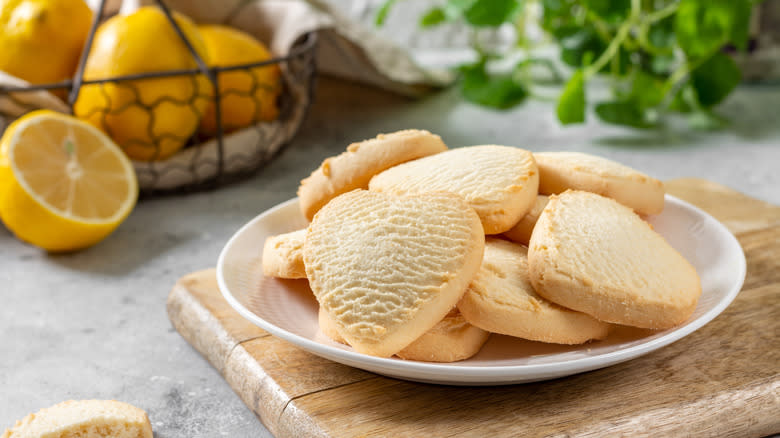
It's all well and good to use lemon juice in pie fillings and salad dressings when you can add as much liquid as you want, but if you want a tart lemon flavor in dry recipes, it's not so simple. When making recipes that require precise ratios of wet and dry ingredients, adding extra lemon juice isn't an option. For example, if you add too much liquid to pie crust, it will become tough rather than flaky, nullifying the benefit of the lemon flavor. Similarly, biscotti requires a perfectly crisp, crunchy texture, and adding liquid to the recipe would threaten this defining characteristic.
When adding lemon flavor to baked goods that hinge on the ratio of wet to dry ingredients, zest is the best way forward. You only need a teaspoon or two for the bright, punchy flavor to cut through the other ingredients, and since its taste comes from oil rather than juice, it does not disrupt the delicate balance of moisture in the recipe. A few gratings of zest will transform the taste of a pie crust without running the risk of a soggy bottom, while a mere sprinkling can turn bland biscotti into a fragrant treat without compromising their trademark crunch.
Use Lemon Juice As A Natural Kitchen Cleaning Agent
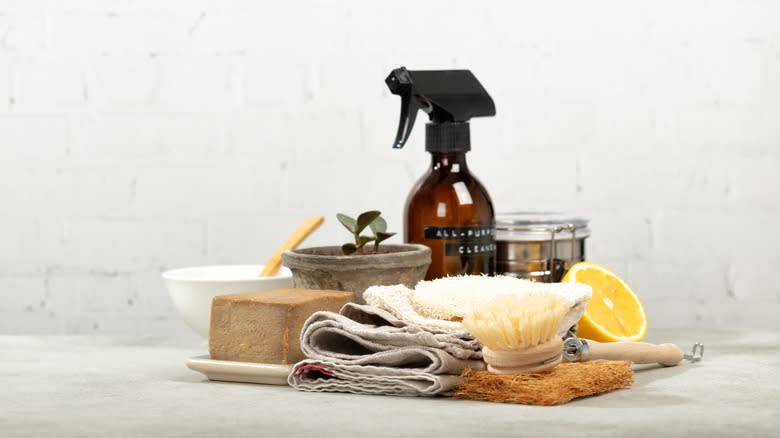
Lemon juice doesn't just taste and smell nice -- it also happens to be ruthlessly effective at killing bacteria and mold. Its power stems from its high levels of citric acid, which is antibacterial and antiseptic. A cleaning solution made with lemon juice can clear your home of mold spores, bacteria, and general grime, leaving it sparkling clean, and beautifully fragranced, too. If you've been using vinegar as a natural cleaner, lemon juice is a great addition to your cleaning arsenal. Unlike certain harsh chemicals like bleach, both substances are safe to use around children and pets and on kitchen surfaces. They both kill bacteria and mold spores and can remove stains and limescale. In contrast to the pungent smell of vinegar, however, lemon juice doubles up as a natural perfume, deodorizing surfaces as you clean and leaving your house smelling like an Italian garden.
When incorporating lemon juice into your cleaning routine, there are a host of options. It can clean windows and glass, freshen up your countertops, sanitize your trash can and microwave, and even polish pots and pans. Lemons are also a great way to clean tricky devices like cheese graters. Instead of shredding another sponge (or your fingers) trying to get the tiny, sharp crevices clean, simply scrub half a lemon on either side of your grater and wash off the residue.
Use Lemon Zest For Homemade Seasonings
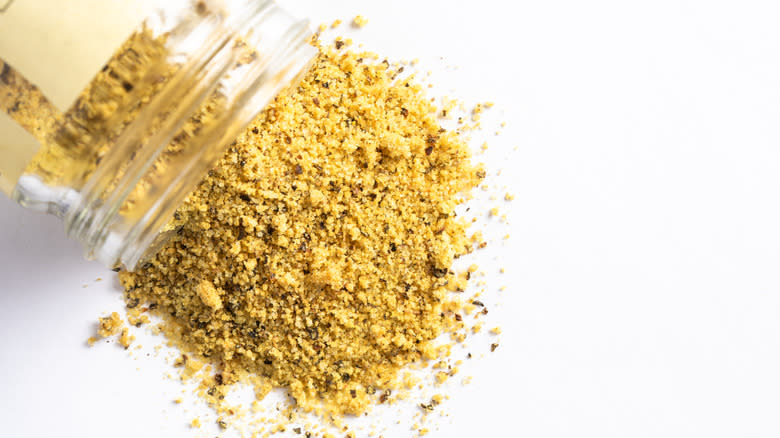
Just as lemon zest is the best ingredient for filling dry recipes with lemon flavor without disrupting their texture, it is also the ideal ingredient for homemade seasonings. Lemon juice would turn a dry seasoning mix into a damp, clumpy mixture susceptible to mold and bacteria, but zest is dry enough to maintain the long shelf-life of a standard seasoning and mix seamlessly with the other dry ingredients.
Whether you're barbecuing meat or roasting potatoes, the right seasoning can revolutionize an entire meal. An unexciting chicken breast can be transformed into a spicy, herby, aromatic piece of heaven, and even the dullest vegetable can become a flavor-packed side dish to rave about. You can buy premade seasonings and rubs from the grocery store but making them at home allows you to tailor them to your tastes and use your creativity. For a classic, easy option, simply combine lemon zest with salt and black pepper. This trio of ingredients can also act as a starting point for any number of combinations. Thyme, cayenne pepper, garlic powder, and curry powder are all options that will complement the lemon zest and create a seasoning that you'll want to use for every meal.
How To Store Lemon Juice
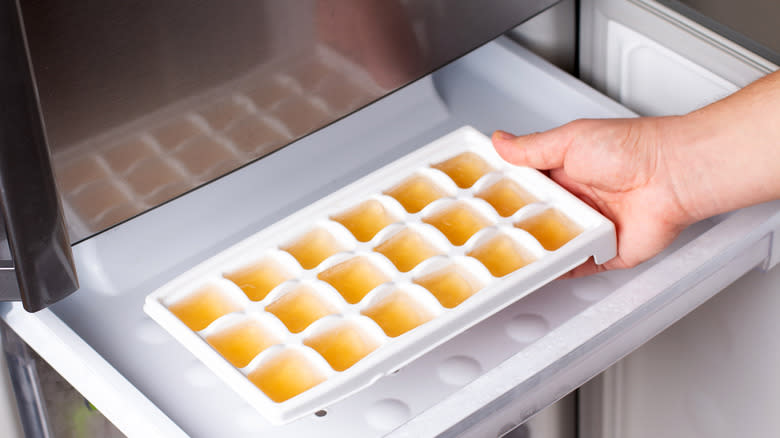
Despite being antibacterial, lemon juice does not last forever. Fresh lemon juice will last up to two weeks in an airtight container in the refrigerator before it starts to taste rancid. Eventually, it will grow mold that you definitely do not want to ingest. Store-bought lemon juice is usually sterilized through pasteurization to give it a longer shelf life, and many brands contain preservatives. Because of this, store-bought lemon juice can last up to a year without tasting rancid, though it doesn't provide the same bright, citrusy flavor that freshly squeezed lemon juice does.
If you've made lemonade, lemon cake, and every lemon-related recipe you can think of and still have leftover lemon juice, there is a simple option for storing it that doesn't rely on a two-week refrigeration window. Simply pour the juice into an ice tray and freeze it until you need it.
If you have whole lemons that you want to preserve, you can slice them into thin rounds and freeze them in Ziploc bags. You won't be able to juice them, but you can put the rounds in drinks as an alternative to lemon water.
How To Store Lemon Zest
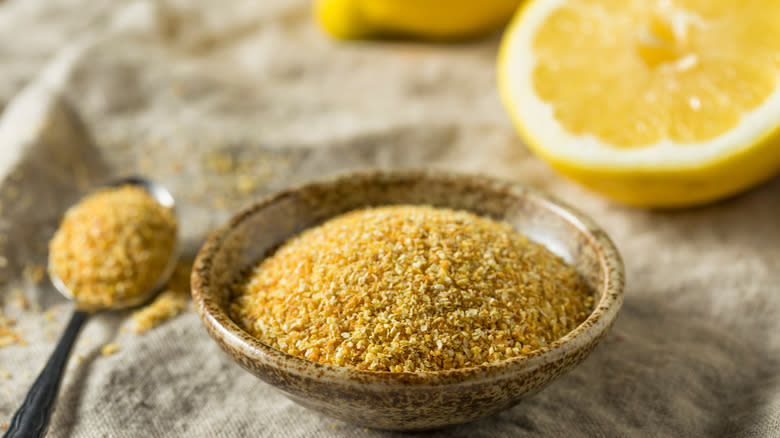
Lemon zest is not immune from going bad, and unlike lemon juice, it is harder to use in large quantities. Leftover lemon juice can be made into lemonade, popsicles, and lemon water, but no matter how much you love lemons, you can't bury every dish in zest. The most convenient way to store this part of the fruit is to grate it and put it in the freezer in an airtight container. That way, it's easy to grab when you need it for a recipe.
Another option is to dehydrate it by putting it on a lined baking sheet in the oven at 200 degrees Fahrenheit. Then you can put it in a jar and use it as you would any other herb or spice. If you're looking for a more involved and fancy way to use the leftover zest without eating it right away, why not make lemon-infused oil? Simply warm the zest and some olive oil in a saucepan, transfer it to a jar, and let it sit overnight. Then, drain the oil into a separate container and discard the zest. You can use the oil as a standalone condiment on salads and cooked vegetables or use it instead of plain cooking oil.
Read the original article on Mashed.

